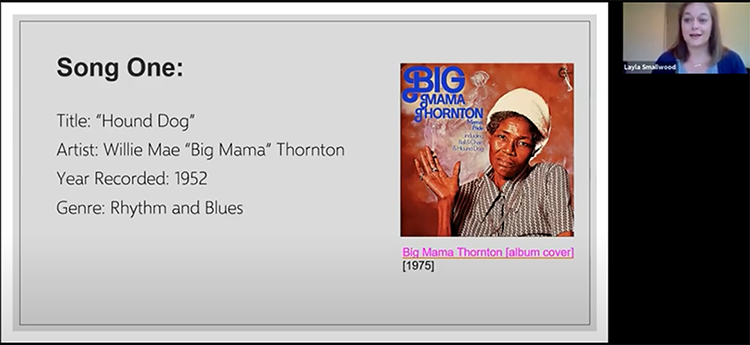MTSU’s Center for Historic Preservation is transforming its usual in-person professional development workshops into online webinars to inform teachers about ways to keep students engaged with history.
The Teaching with Primary Sources program, funded by the Library of Congress, focuses on helping teachers find and use historical artifacts and images to bring history to life for their students.

Dr. Stacey Graham

Kira Duke
“Summertime is a very busy time in our schedule for conducting face-to-face teacher workshops because, of course, that’s when teachers are available for those,” said Dr. Stacey Graham, CHP research professor and TPS project coordinator.
The “Digging In with TPS” webinars feature polls, chat box conversations, question-and-answer sessions and other interactive features to involve participants in real time.
“We’re still thinking of more ways to make it interactive because we miss that element just as much as we imagine the teachers do,” said Kira Duke, CHP specialist.
The second webinar, “Tennessee Music,” which debuted June 11, employs audio from four different songs to explore Elvis Presley’s blues and rockabilly influences and puts them in societal and historical contexts. It’s available to watch above.
 The COVID-19 pandemic, which prompted teachers to further their students’ education while practicing social distancing, inspired the first TPS summer webinar, “Historic Epidemics,” which debuted May 14.
The COVID-19 pandemic, which prompted teachers to further their students’ education while practicing social distancing, inspired the first TPS summer webinar, “Historic Epidemics,” which debuted May 14.
A complete schedule of upcoming webinars is available at https://library.mtsu.edu/tps/workshops.
Tuberculosis was the focus of the inaugural webinar, but Graham said observers can find at least two major takeaways from histories of all pandemics that can apply to the current response to the novel coronavirus.
History teaches us, Graham said, that we need to be patient.
“Most pandemics in history last for a very long time and keep recurring after a few years,” she said.

In “Tennessee Music,” Layla Smallwood, a doctoral student in MTSU’s Public History Program, shown in the screen at upper right, explains how “Big Mama” Thornton’s 1952 recording of “Hound Dog” influenced Elvis Presley’s 1956 version. “Tennessee Music” is the second in a series of “Digging In with TPS-MTSU” webinars hosted by the Center for Historic Preservation. (Screen capture)
The other takeaway is comparing how governments in different eras become involved when pandemics develop.
“It’s kind of interesting to see the different forms that government involvement takes when it comes to how much that can impact people’s behaviors and the impact on their health,” Graham said.
“Historic Epidemics” is available to view below.

Layla Smallwood
Layla Smallwood, a doctoral candidate in MTSU’s Public History Program, is involved in the webinars with Graham and Duke. She emphasized the need to employ a variety of media.
“Nobody wants to sit there and listen to somebody talk to a computer screen,” Smallwood said. “Using all types of media and putting them into your resources, whether it’s a lesson plan, an activity, a webinar, anything like that, is going to make it … relevant to the people who are using it or who you’re showing it to.”
Teachers can access resources used in the webinars for their own presentations and lectures at https://padlet.com/tps_mtsu/DiggingIn.
“We’re excited to see what the overall response will be to these webinars, and we’ll continue those as long as people are finding them useful,” Duke said.
For more information about the webinars, visit https://library.mtsu.edu/tps or contact Graham at stacey.graham@mtsu.edu, Duke at kira.duke@mtsu.edu or Smallwood at layla.smallwood@mtsu.edu.
— Gina Logue (gina.logue@mtsu.edu)


COMMENTS ARE OFF THIS POST